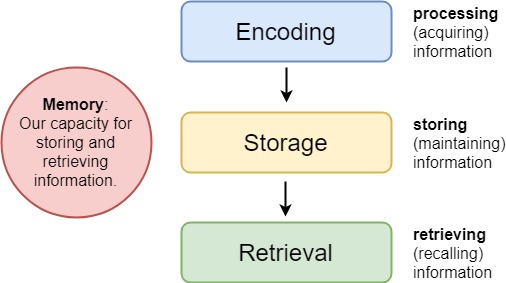Memory is critical to academic success. Your memory helps you learn, and do well on exams, but it also helps you develop your own ideas, join in academic discussions, interview for jobs, and much more.
Learning and remembering are two different activities.
- Learning is about understanding a new concept, theory, method or piece of information.
- Remembering is about being able to recall your learning accurately when you need it.
Taking time to do both activities (not at the same time) is more efficient because you won’t have to relearn material that you didn’t understand the first time around.
Did you know you can improve your memory? Read on to learn how!

We encode what we pay attention to, otherwise it fades in seconds. Then, our short-term memory lets us work with information long enough to store it in long-term memory. Retrieval involves getting information from long-term memory and using it.
The diagram below shows how encoding means processing, storage means maintaining, and retrieving, information. Our memory involves all three connected stages.

Pay attention to information that you want to remember, to encode it in your short-term memory. You can’t remember something that you haven’t paid attention to.
- In lectures, put your phone away, listen, take notes, and ask questions (even just in the margins of your notes).
- Avoid distractions.
- When you read, engage actively with the new information.
- Take breaks, spread out the work over time, and plan to get enough sleep, nutrition, exercise and relaxation time over the week to support your attention levels.
- Remember that you can’t review something until you’ve learned it! Don’t try to do both at the same time. Use our time management resources to protect your learning and reviewing time over the term.
- Re-reading your textbook or notes is not the most efficient or effective way to remember course content. Try these active strategies instead; they ask you to make decisions about what information to understand and recall, and how to explain it.
- Organize and summarize information:
- Select key concepts, major topics as described in the course learning objectives, material heavily weighted in lectures or labs, etc.
- Organize information so that related pieces are grouped together thematically, chronologically or hierarchically.
- Make a mind map of the course, and add to it as the term progresses. Include key ideas and their connections. This strategy is efficient and produces a study sheet for exam time.
- Use our concept summary template for math, chemistry, physics and economics courses.
- It’s particularly important in science or math courses to do practice questions and look for patterns and cue words to identify concepts being applied.
- Write summaries in your own words. Avoid learning by rote; if you memorize a concept or formula in only one format or phrase, you might not recognize it on an exam if it takes a different form or the question uses different wording. Your understanding should be flexible.
- Explain why a fact or concept is true. Connect it to what you already know.
- Explain why you should go through specific steps as you solve a problem.
- Test yourself. Use the Queen’s Exam Bank, textbook chapter questions, and course tests or assignments. The greatest benefit comes from generating your own questions for self-testing; base these on the concepts identified in the course learning objectives.
- Teach someone else; this process makes you select information, organize it, and explain it. Try using creative analogies to help make an abstract idea clearer and more memorable.
- See our exam and test prep resources for more review strategies and how to prepare for different types of exams.
Preview lecture notes, slides, lab instructions or readings before classes/labs/tutorials to get a sense of the main ideas that class will cover.
Take notes during class.
Review information shortly after you learned it the first time (right after class, or within a few days):
- take 10-30 minutes in the evening to review what you covered in classes that day, or
- take an hour or so on the weekend to review the week’s notes.
Review (skim) older information from previous weeks briefly but regularly (for example, every couple of weeks).
Use spaced practice: short review sessions with breaks, spread over days or weeks, are much more effective and efficient than a marathon study session.
This reviewing habit will strengthen your memory of that content and pay off at exam time!
Take breaks to consolidate memories into long-term storage. Try studying or reading for 50 minutes, then take a 10-minute break during which you don’t take in more information. Repeat once or twice, then take a longer (1-2 hour) break.
Get enough sleep. It’s essential for your brain to transfer information to long-term memory.
Your need for sleep increases during times of intense learning and memorization. Get 8-9+ hours of sleep a night during exams or other periods of high demand.
See our Academic Stress page for resources.
Visit Student Wellness Services for help with sleep, healthy eating, and exercise, all of which will support your ability to remember.
See our Time Management resources for help with making time, getting organized and creating a balanced life.